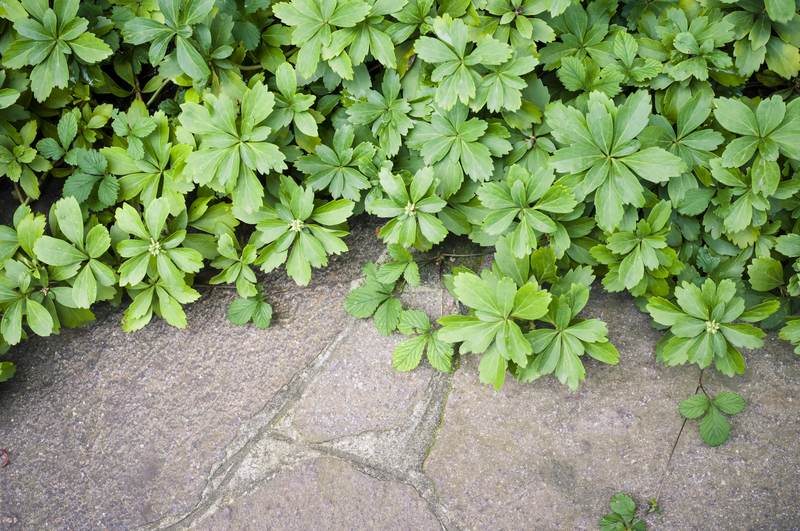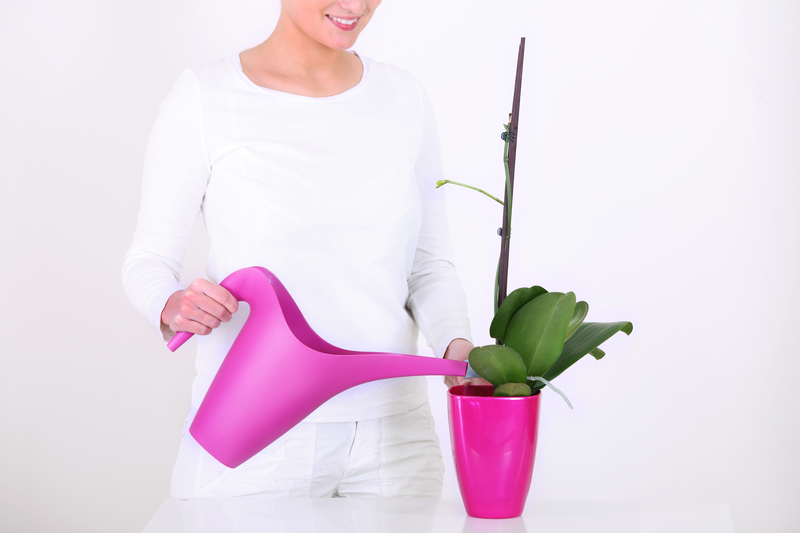A Gardener's Treasure: Three Poignant Tips for Controlling Weeds
Posted on 09/09/2025
A Gardener's Treasure: Three Poignant Tips for Controlling Weeds
For every gardener, a thriving green space is a true labor of love. Yet, lurking among carefully cultivated blooms and cherished vegetables are persistent interlopers: weeds. Managing weed infestations is an enduring challenge, but it's not insurmountable. With the right strategies, turning your garden into a bountiful and weed-free paradise becomes possible. In this comprehensive guide, we'll explore three timeless and effective tips for controlling weeds in your precious plots. Get ready to transform your gardening journey!

Understanding the Importance of Weed Control
Before delving into our three poignant tips, it's vital to underline why controlling weeds matters for every gardener. Weeds are more than just unsightly intruders--they're fierce competitors for sunlight, water, and nutrients. If left unchecked, these opportunistic plants can:
- Reduce the yield and vigor of your favorite crops
- Provide a habitat for pests and plant diseases
- Disrupt the visual harmony of your landscape
- Drain your motivation with endless maintenance
Effective weed management is a fundamental Act of care in any garden. It's the cornerstone of healthy, abundant, and visually stunning outdoor spaces.
Tip 1: Cultivate Vigilance - The Power of Early and Consistent Intervention
Be Proactive, Not Reactive
One of the best gardener's treasures for weed management is to act early and often. Don't wait for unwelcome guests to take over. Instead, develop a routine of:
- Regularly inspecting beds - Walk your garden at least once a week, especially after rain.
- Identifying weed seedlings - Learn to distinguish young weeds from your desired plants and pull them out while their roots are shallow.
- Hand weeding before seed set - Uproot weeds before they flower and produce seeds, greatly reducing future populations.
This approach is especially crucial in early spring when soils warm up and many weed seeds germinate. By intervening while weeds are small, you minimize competition, prevent seed dispersion, and break the weed lifecycle. Remember, one year's seeding leads to seven years of weeding!
Expert Insight: The Seed Bank Dilemma
Gardens harbor what botanists call a "seed bank," constituting thousands of dormant seeds just waiting for the right conditions. Disturbing the soil, over-tilling, or neglecting weed removal allows this bank to spring to life. A vigilant gardener limits this by tackling weeds before they mature, keeping the seed bank in check.
Rapid Intervention Tools for Controlling Weeds
- Hori Hori Knife - Slices deep taproots with ease.
- Hand Hoe or Dandelion Digger - Perfect for extracting younger weeds from loose soil.
- Garden Gloves - Allow quick spotting and gentle removal without harming crops.
Tip 2: The Mighty Mulch - Nature's Blanket Against Weeds
Why Mulch is a Gardener's Best Friend
Mulching is not just an aesthetic finishing touch--it's a powerful tool for controlling weeds naturally. When you cover the soil between your valuable plants with a protective layer, you create hostile conditions for weeds to thrive.
- Suppresses weed seed germination by blocking sunlight
- Conserves soil moisture and moderates temperature, benefiting your chosen plants
- Improves soil structure and organic matter as it decomposes
- Reduces soil erosion and compaction
Organic mulches are especially valuable, including shredded bark, straw (ensure it's weed-free!), leaf mold, compost, pine needles, or even grass clippings in thin layers. Inorganic options such as gravel or landscape fabric can also be effective in certain beds or paths.
Mulching Techniques for Maximum Weed Control
- Apply 2-4 inches of mulch around (but not against) plant stems.
- Replenish mulch annually, especially after composting or soil disturbance.
- Remove weeds before laying mulch for best results.
- Combine with cardboard or newspaper underneath mulch for extra weed suppression power.
Tip: Be cautious when using grass clippings or straw. Ensure they come from untreated, pesticide-free lawns/farms to avoid introducing chemicals or weed seeds into your garden.
Best Areas to Mulch for Weed Control
- Vegetable and flower beds
- Around fruit trees and shrubs
- Garden paths and borders
- Under hedges or other perennial plantings
Cultivate this habit and witness your garden flourish as weed pressure dramatically declines.
Tip 3: Smart Planting Strategies - Outwit Weeds with Design
Use Plant Density and Variety to Your Advantage
A lush, vibrant garden isn't just beautiful--it's a natural defense system against weeds. By closely spacing desirable plants and interplanting groundcovers, you can minimize open soil where unwelcome plants might sprout.
- Densely plant rows and beds to shade soil faster, denying weeds the sun they crave.
- Use living mulches (such as white clover or low-growing thyme) to create a green "carpet" under and between taller crops.
- Stagger planting dates or practice succession planting to keep soil occupied as the season progresses.
In addition, rotating crops every year disrupts the patterns of site-specific weeds, while companion planting can create micro-environments that deter weed growth. High-quality seeds and robust seedlings quickly establish themselves, further crowding out slow-growing weeds.
Selecting the Best Plants for Weed Suppression
- Vigorous perennials such as daylilies, hostas, and iris for borders
- Groundcovers like creeping thyme, sweet woodruff, or ajuga between stepping stones
- Leafy vegetables (lettuce, spinach) in tight "carpet" plantings
- Trailing squash or pumpkins in vegetable beds for dense shading
Tip: Beware of overly aggressive groundcovers (e.g., mint or purple loosestrife), which can become invasive themselves!
Additional Treasures for Sustainable Weed Control
Organic and Eco-Friendly Methods
- Boiling water: An immediate (though non-selective) way to kill weeds on paths or driveways
- Natural herbicides: Vinegar, soap, or citrus-based sprays can work on young weeds. Use care--these can harm garden plants and soil health if misapplied.
- Solarization: Lay clear plastic over fallow soil in midsummer for several weeks. Sunlight "cooks" weed seeds and soil-borne pathogens.
- Cover crops: In off-seasons, sow rye, buckwheat, or oats to suppress weeds, protect soil, and add organic matter.
Avoiding Common Weed Control Mistakes
- Never compost mature weeds with seeds unless you're hot-composting at 140?F+.
- Avoid deep tilling, which can bring dormant weed seeds to the surface.
- Don't let garden edges go wild--they're a weed seed source!
With a little planning and these natural, eco-friendly weed control techniques, your garden can remain thriving and healthy through every season.
Understanding the Enemy: Types of Common Garden Weeds
Annual, Biennial, and Perennial Weeds - Know Their Habits
Annual weeds such as chickweed, crabgrass, and pigweed complete their life cycle in a single year but produce enormous quantities of seed. Biennial weeds like burdock live two years, usually flowering and setting seed in the second year. Perennial weeds--the most troublesome--include bindweed, dandelion, and quackgrass, returning year after year from deep roots or creeping rhizomes.
By recognizing these weed categories, you can tailor your strategy--annual and biennial weeds are best tackled before they set seed, while perennial weeds often require repeated removal or smothering to exhaust their energy stores.

Pesticide-Free Weed Control: Why Many Gardeners Say "No" to Chemicals
While commercial herbicides may promise quick fixes, they bring risks:
- Potential danger to pollinators, pets, and beneficial soil organisms
- Long-term buildup in garden ecosystems
- Possible contamination of homegrown produce
Many expert gardeners ecstatically report that, with vigilance, mulching, and smart planting, chemical-free control is both achievable and rewarding. Nature-friendly gardening is a growing trend--both for the safety of your environment and the satisfaction it brings!
Conclusion: Treasure Your Garden, Tame Your Weeds
Weeding and weed prevention may not be glamorous, but they are essential acts of stewardship for any gardener's treasure. By incorporating
- Vigilant, regular monitoring
- Clever use of mulches
- Smart garden design with dense plantings
Remember: Every time you suppress a weed before it spreads, you are investing in a vibrant legacy that future seasons--and future generations--will enjoy.
Happy gardening! Keep these three poignant tips for controlling weeds close at hand, and watch your landscape become a lush, flourishing oasis--the true gardener's treasure.
Latest Posts
From Organic Clutter to Soil Enrichment
Handy Gardening Tools for Every Outdoor Connoisseur
Unlock the Potential of Your Hedges with Expert Trimming

